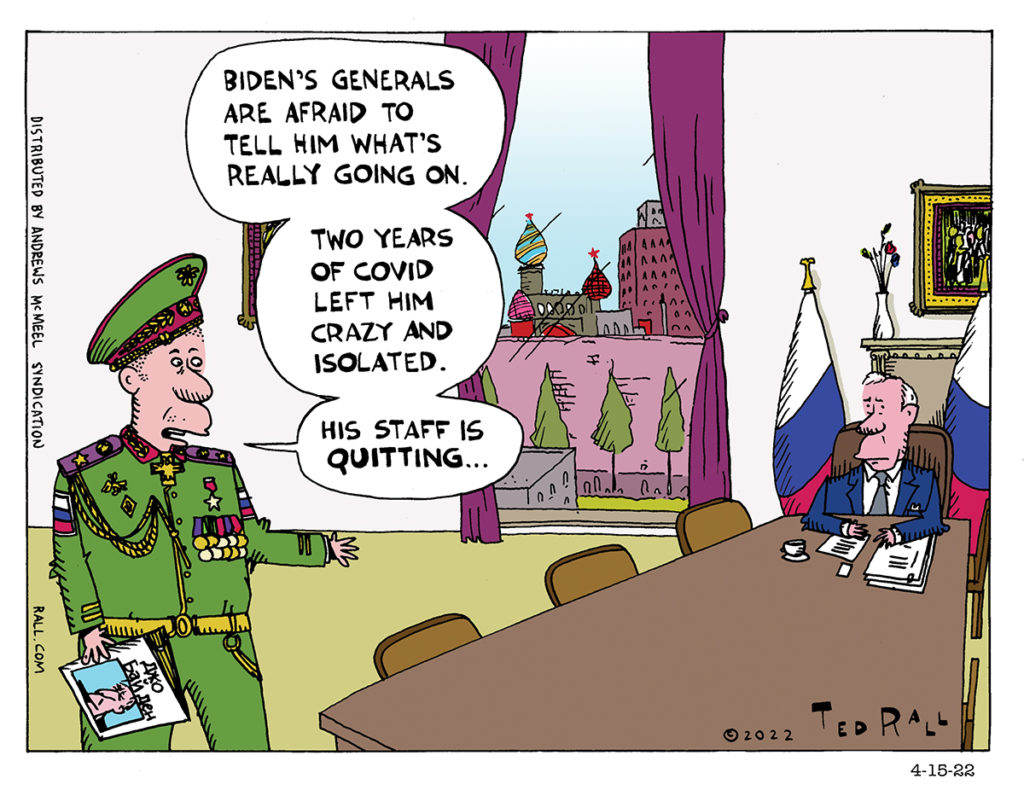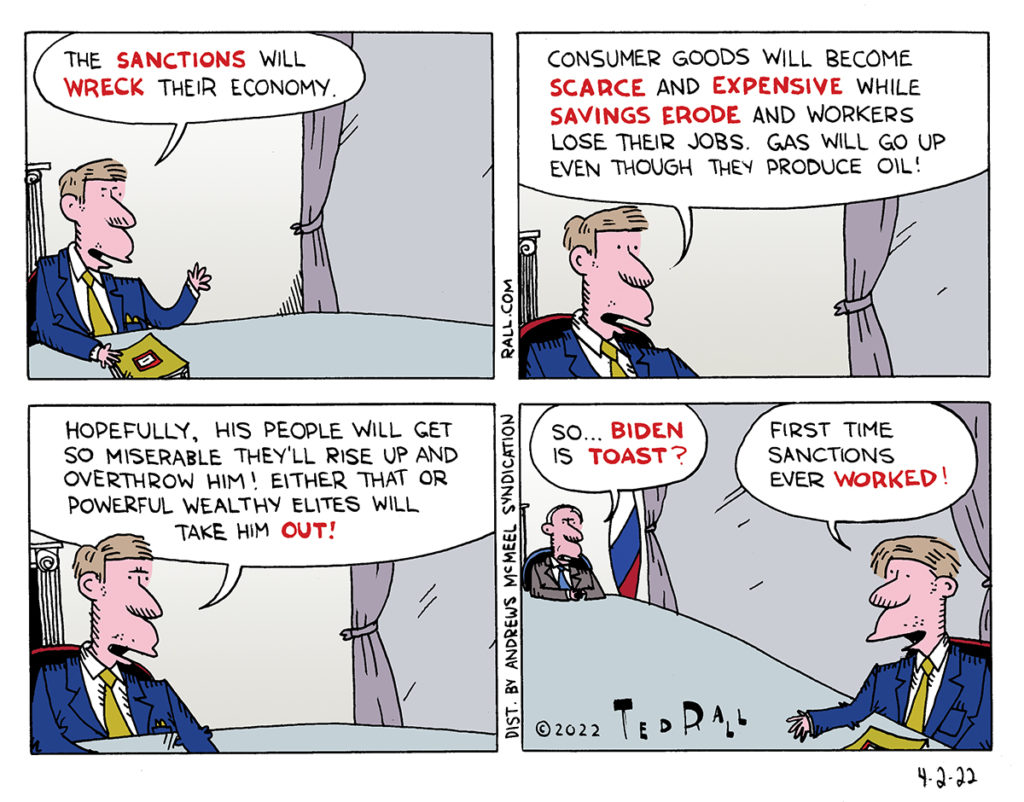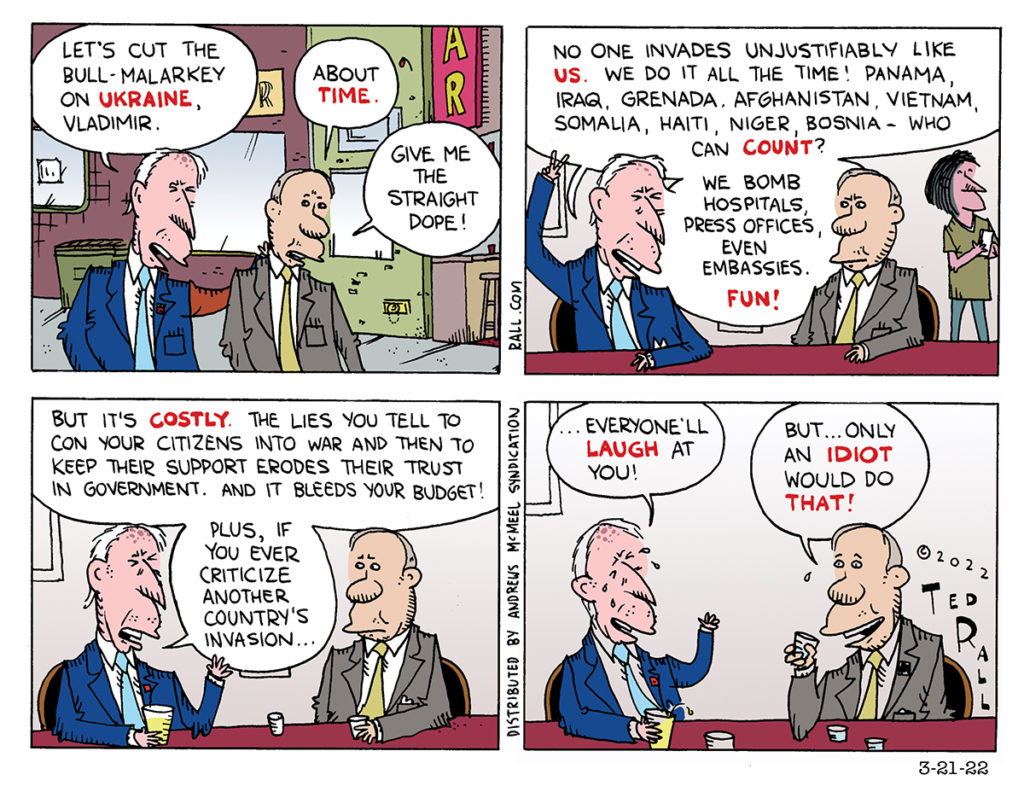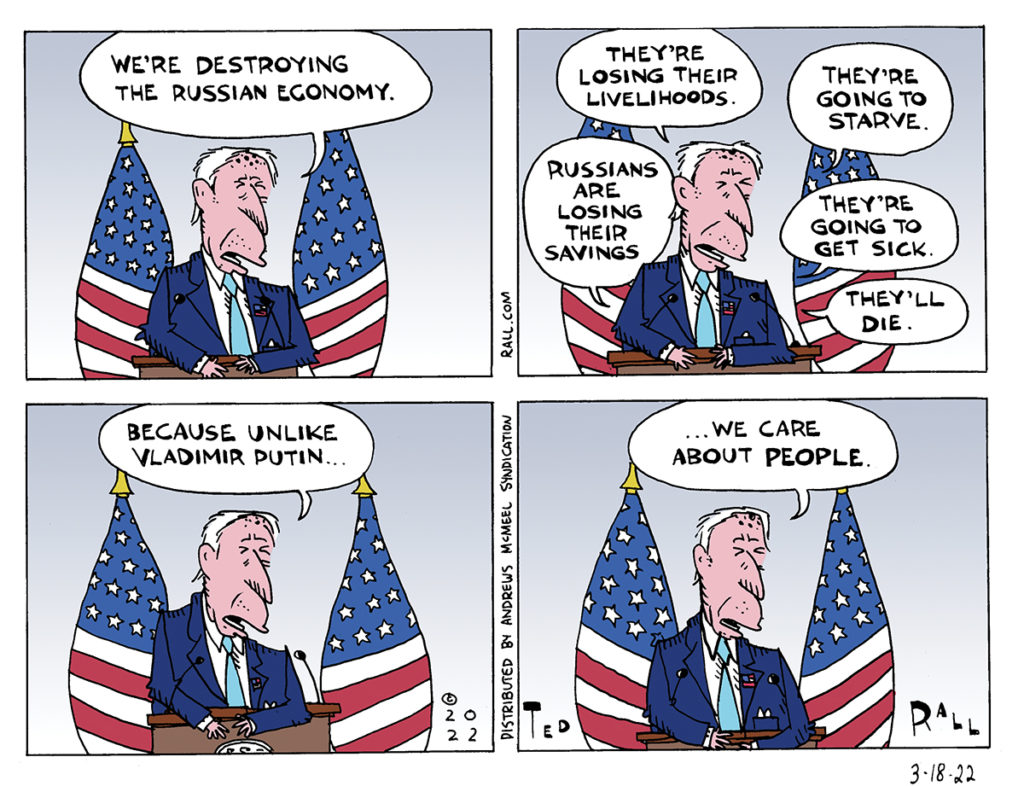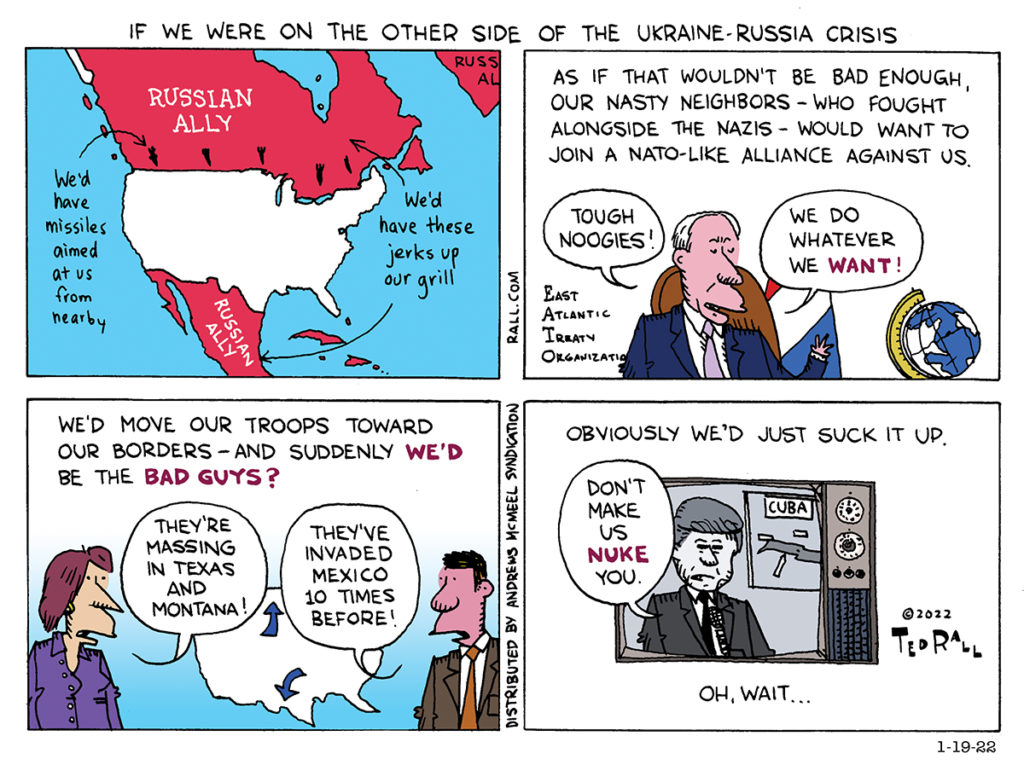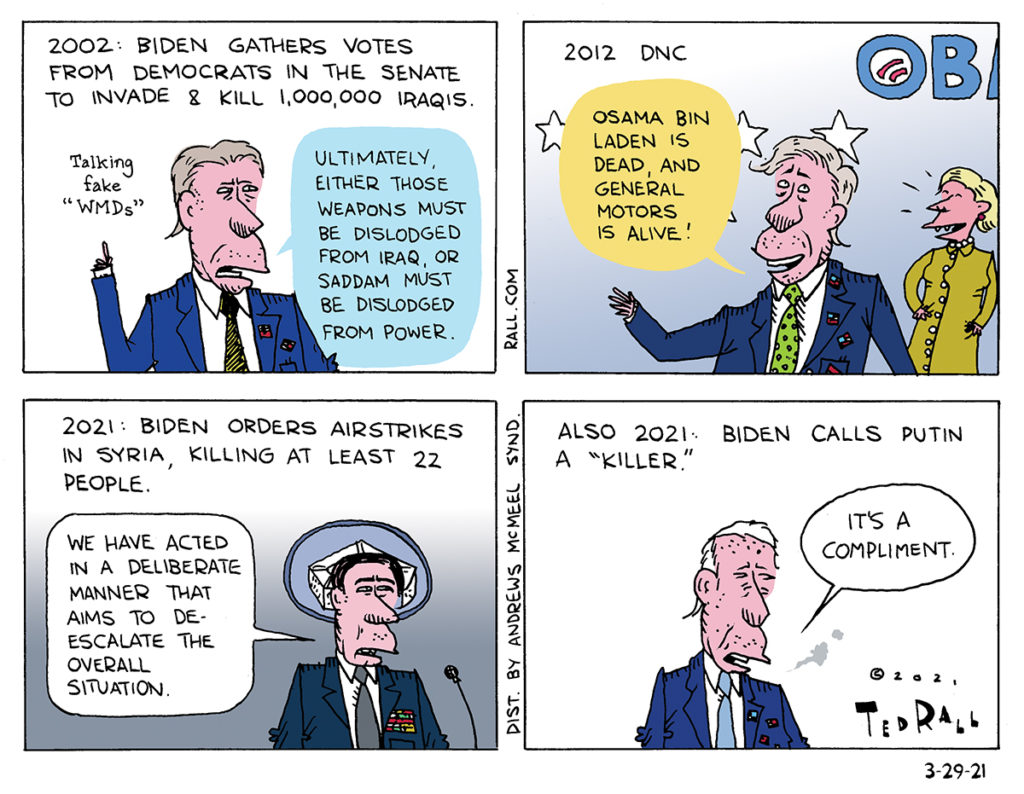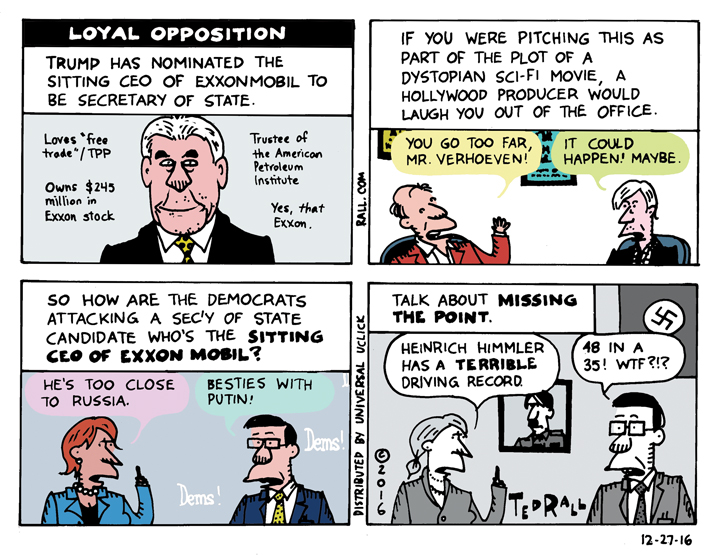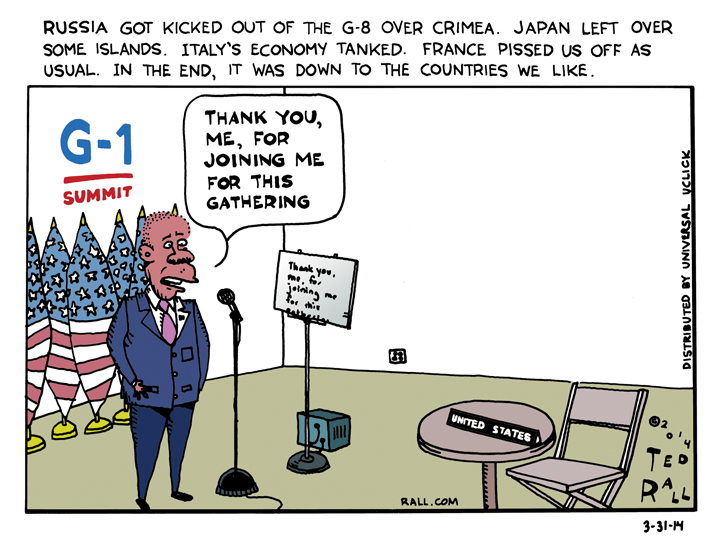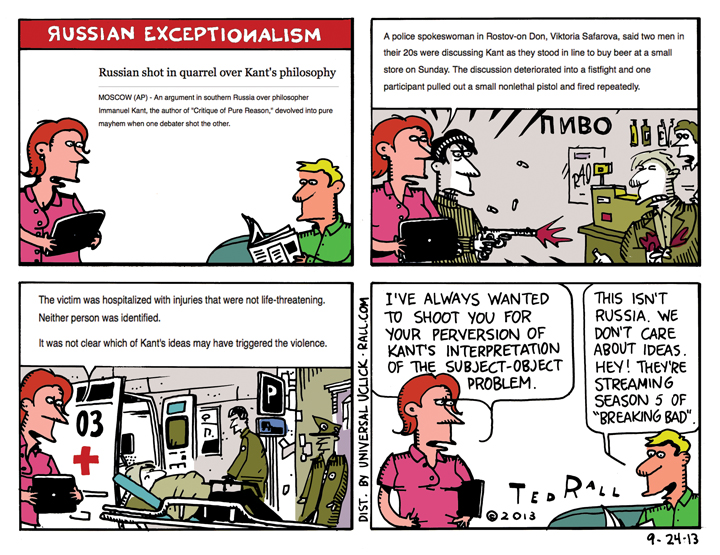It’s impossible to know whether any of this is true or even if US intelligence agencies really believe it, but part of the propaganda war against Russia is spreading the message that president Vladimir Putin is out of touch, doesn’t really know what’s going on and is losing his mind after two years of COVID-19 related lockdowns. Of course, it’s entirely possible that the Russians believe the same things about American president Joe Biden.
We Have Met the Sanctions and They Are against Us
Western nations including the United States have imposed brutal sanctions against Russia in an effort to derail its economy. However, the world is so interconnected and dependent on Russian energy that these countries are shooting themselves in the foot. Effectively, the sanctions are against ourselves.
Finally, Straight Talk on Ukraine
What if Joe Biden were to admit to Vladimir Putin the obvious truth, that the United States is an expert in all the acts of villainy Russia is committing and accused of in Ukraine? What if he warned Russia that it would suffer the same loss of credibility United States has in criticizing Russia?
Support People by Killing Other People
American politicians and television viewers have been deeply moved by images of the suffering people of Ukraine. Unfortunately, the main response has been to impose brutal sanctions on Russia that will destroy the Russian people but not their leaders, who are well insulated from the effect of sanctions. If humanitarianism is the point here, what about the people, the human beings, of Russia?
If We Were on the Other Side of the Ukraine-Russia Crisis
First the United States and its allies pressure Russia by placing missiles in Poland, near its border. Then the West tries to expand NATO right up to the Russian border, by inviting Ukraine to join. When the Russians respond by massing troops along their own border, we have the unmitigated nerve to say that they are provoking us.
SYNDICATED COLUMN: Why I Miss the Berlin Wall

This week’s coverage of the 25th anniversary of the fall of the Berlin Wall brought me back, not to warm fuzzies about peace and freedom and Gipper Ron Ron and winning the Cold War, but the reaction of my former BFF Dan (whom I miss for his talent for lightening-quick, wicked-brilliant repostes).
The Berlin Wall has fallen, I informed him. Germany is reunited.
Thoughts?
“This,” he replied as usual without missing a beat, “is like the reunion tour recently announced by Crosby, Stills, Nash and Young. I didn’t care for any of their previous collaborations, and I’m not looking forward to the next one.”
The former two Germanies haven’t given us another Hitler. Not yet. But Germany 2.0 did revive and realize the Führer’s dream of uniting Europe into a unified trading bloc, with a common currency, big enough to give the United States a run for its devalued money. The new euro was, naturally, pegged to the old Deutsche Mark. Germany is by far the most powerful nation in Europe.
Which is a good place to start my List of Reasons I Miss the Berlin Wall.
As usually-correct economist-professor-columnist (and usually ignored) Paul Krugman has pointed out over and over, the German-dominated European Union — which would never have come into being had the Wall remained standing and the Soviet bloc continued to exist — has been an unwieldy amalgam of political autonomy and fiscal union, dragging relatively poorer nations like Portugal, Italy, Greece and Spain (“PIGS”) into a vicious cycle of austerity, budget cuts and seemingly endlessly rising unemployment. “The creation of the euro was about politics and ideology, not a response to careful economic analysis (which suggested from the beginning that Europe wasn’t ready for a single currency),” Krugman wrote in May.
Why should hard-working Germans bail out lazy, corrupt Mediterranean nations? Protestant pundits ask. Scratch the surface of the Eurozone crisis and you find that the Germans aren’t the victims here. Far from propping up their swarthy southern partners, Germans are using their control over the euro to turn the PIGS into trade debtors.
Adolf blew his brains out but Germany won the war. Cuz: reunification.
The most important consequence of the fall of the Berlin Wall was, of course, the 1991 dissolution of the Soviet Union. “Economic shock therapy” — U.S.-backed Russian President Boris Yeltsin’s misbegotten attempt to convert the USSR’s state economy to neoliberalist capitalism overnight — led to the infamous Russian Mortality Crisis, when death rates soared 40% in Russia, and even higher in other former Soviet republics.
It has been estimated that 30 million people either died or will die as the result of the catastrophic dissolution of the USSR.
Socialism was destroyed but not replaced. The power vacuum opened by the collapse of the Soviet system was quickly filled by gangsters. Corrupt former factory managers forcibly seized state property and industries whose profits might otherwise have been used to create a blow-softening social safety net for the millions who lost their jobs. Hard drugs from Central Asia and Afghanistan, set free to fall apart after Gorbachev stepped down, supplemented rampant alcoholism. The infamous Russian oligarchy rose during this period, widening the gap between rich and poor, and set the stage for Putinism supported by traumatized Russians who happily chose authoritarianism over the anarchy of the post-Soviet period.
No wonder most Russians tell pollsters they miss the Soviet Union.
Former Soviet client states lost their financial and military backing. Nations like Somalia and Congo disintegrated into bloody civil conflict.
But hey. The demise of the Evil Empire was good for the United States, right?
Not really.
American and European citizens paid trillions for the Cold War. After 1991, pundits promised a “peace dividend” — lower taxes, more public spending on infrastructure and social programs. Barely two years later, the peace dividend was gone — spent, ironically, on the high costs of the Soviet collapse.
“Defense cuts and reductions in military forces have brought in their wake a series of job losses,” Britain’s Independent newspaper reported in 1993. “The transitional costs of the end of the Cold War, combined with the inadequacy of government responses across Western Europe, have meant that we are worse, not better, off.”
You’d think that, as believers in the magic of the marketplace, Americans would see the value of competition in the world of ideas, militarily and politically, on the international scene. Whether or not they admit it, however, citizens of the United States have gotten softer and dumber after assuming their status as the world’s last remaining superpower. Unchallenged ideologically and otherwise, Americans questioned themselves and their beliefs in capitalism and American exceptionalism even less after the 1990s than before. But now, as de facto rulers of the last empire, Americans became the obvious targets of choice for opposition forces that want to change the new order, like fundamental Islamist movements.
It’s tough to disagree with the French writer Nicolas Bonnai, who noted in Pravda in 2012: “The US oligarchy [went] berserk, started new wars everywhere with the Bush dynasty and ruined [its] finances. Drastic inequality became the lemma of this crazy society driven by lunatic leaders and wars. Today America leads to nowhere; America is just a [locus] (Al Qaeda) of the new global matrix made of wars and terrors, manipulation and deregulation.”
The fall of the Berlin Wall created at least as many hardships as blessings.
(Ted Rall, syndicated writer and cartoonist, is the author of the new critically-acclaimed book “After We Kill You, We Will Welcome You Back As Honored Guests: Unembedded in Afghanistan.” Subscribe to Ted Rall at Beacon.)
COPYRIGHT 2014 TED RALL, DISTRIBUTED BY CREATORS.COM

